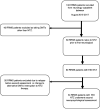Extended Interval Dosing Natalizumab and impact on neuropsychological deficits in Relapsing-Remitting Multiple Sclerosis
- PMID: 35223079
- PMCID: PMC8874183
- DOI: 10.1177/20552173211070752
Extended Interval Dosing Natalizumab and impact on neuropsychological deficits in Relapsing-Remitting Multiple Sclerosis
Abstract
Background: Cognitive impairment and neuropsychiatric symptoms are frequently reported in Relapsing-Remitting Multiple Sclerosis (RRMS). Natalizumab (NTZ) is usually administered on a 4-weekly Standard Interval Dosing (SID) schedule. However, Extended Interval Dosing (EID) at 6-8 weekly intervals has been proven non-inferior regarding relapse risk, with a lower risk of Progressive Multifocal Leukoencephalopathy (PML). The impact of EID NTZ on neuropsychological deficits in RRMS has not been studied. Objective: To determine if EID NTZ demonstrates an improvement in neuropsychological parameters in RRMS patients. Method: We performed a retrospective, observational analysis of 34 RRMS patients treated between August 2015-2017. Patients underwent baseline neuropsychological testing before commencing EID NTZ. A second evaluation was performed, on average 28 months after commencing treatment. Results: Z scores at the initial assessment showed baseline cognitive impairment in multiple domains. 14/20 Z-scores showed an improvement post-NTZ and 5/14 reached statistical significance; namely Trails A (visual attention/processing speed), Line-orientation (visual-spatial), Picture-naming (word finding), Digital-Span (attention, executive function and memory) and Story-recall (memory). The Hospital Anxiety and Depression Scale (HADS) data remained unchanged. Correlation matrix showed no association between HADS scores, the time between assessments and the changes in Z scores. Conclusion: This data suggests the efficacy of EID NTZ in improving cognitive impairment in RRMS. A prospective observational study is warranted.
Keywords: cognition; extended interval; multiple sclerosis; natalizumab; psychology.
© The Author(s), 2022.
Figures
References
-
- Calabrese M, Agosta F, Rinaldi F, et al. Cortical lesions and atrophy associated with cognitive impairment in relapsing-remitting multiple sclerosis. Arch Neurol 2009; 66: 1144–1150. - PubMed
-
- Gilchrist AC, Creed FH. Depression, cognitive impairment and social stress in multiple sclerosis. J Psychosom Res 1994; 38: 193–201. - PubMed
-
- Arnett PA, Higginson CI, Randolph JJ. Depression in multiple sclerosis: relationship to planning ability. J Int Neuropsychol Soc 2001; 7: 665–674. - PubMed
-
- Polman CH, O’Connor PW, Havrdova E, et al. A randomized, placebo-controlled trial of natalizumab for relapsing multiple sclerosis. N Engl J Med 2006; 354: 899–910. - PubMed
LinkOut - more resources
Full Text Sources



